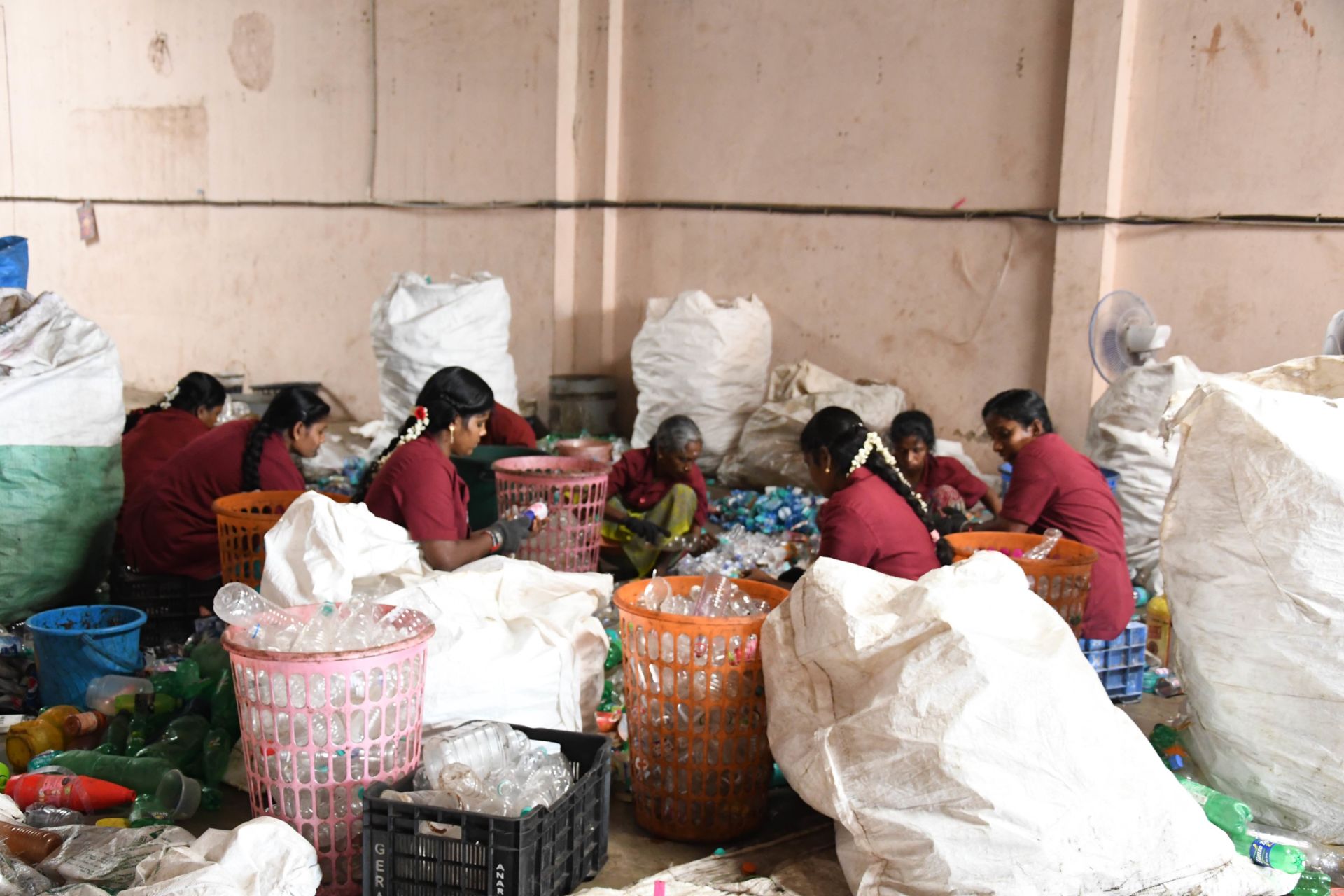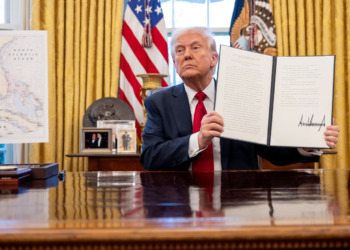Kabadiwalla Connect is a startup that works to support and improve the informal waste management system found in most of the developing world.
Siddharth Hande’s path to co-founding Kabadiwalla Connect began with an interest in sustainability. In college, he and others organized beach clean-ups, and afterward, he completed his masters in development with a technical focus in mapping and logistics. While working in development he noticed that reports regarding waste management only mentioned waste pickers as a footnote, and completely ignored the surrounding system.
Siddharth applied for a grant through the World Economic Forum, which allowed him to co-found Kabadiwalla Connect. The company began with mapping the informal waste management system in Chennai, India. What they found was a hyperlocal, decentralized system that was far more efficient and less expensive than its centralized, formal counterpart. Kabadiwalla Connect is working toward understanding this system more thoroughly and finding ways to increase the volume of waste it processes while preserving its efficiency and improving working conditions for those involved.
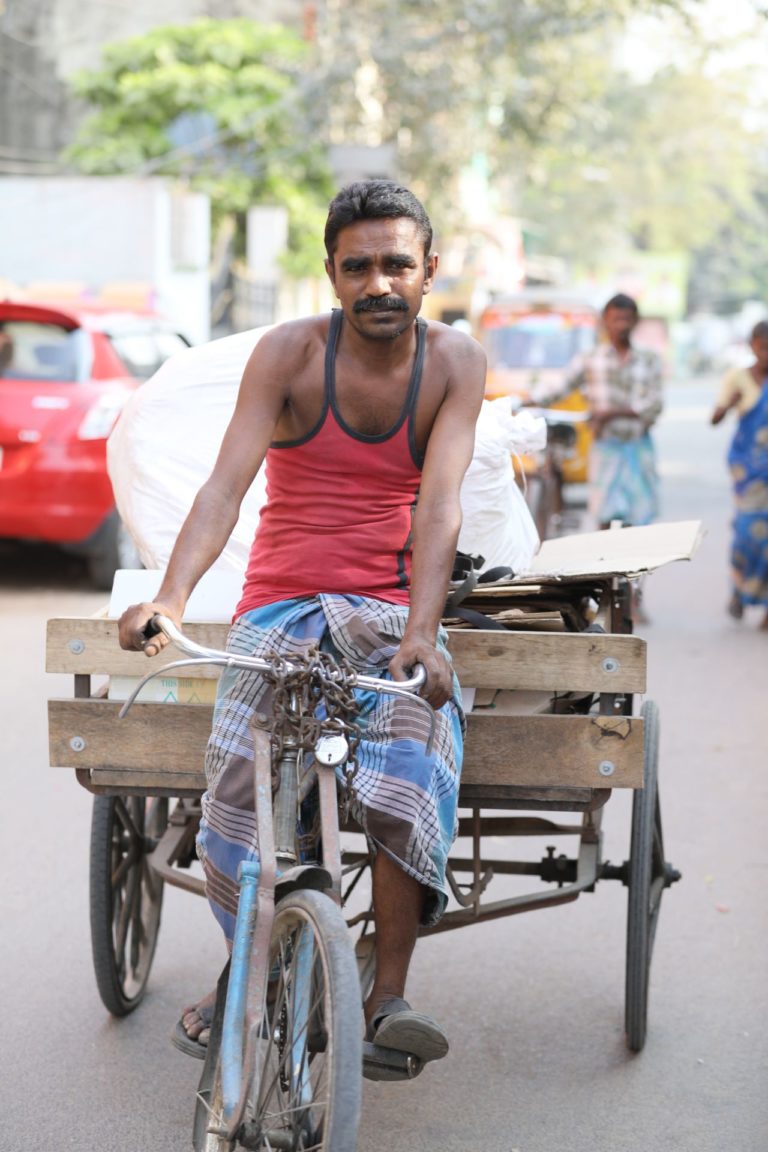
How does informal waste management work in Chennai?
Siddharth Hande: The informal waste management system is found in most of the developing world. It starts with waste pickers collecting valuable material from the streets and overflowing dustbins and selling it to a local scrap shop. These scrap shops are known as Zabbaleen in Egypt; Pepenadores in Mexico; Basuriegos in Colombia; Chamberos in Ecuador; Buzos in Costa Rica; Cirujas in Argentina; Lapak in Indonesia, and Kabadiwallas in India. The material then moves from the scrap shops to a larger aggregator and finally to a processor. Depending on the material, it either gets processed formally or in most cases informally. In India, for example, PET goes to a formal processor, whereas PP and PE are informally processed.
Within Chennai’s waste ecosystem, each type of stakeholder is known by various terms in the local Tamil language. For ease of understanding, we have defined stakeholder groups based on their distinct functional roles on the following basis:
- Level 0 aggregators: Consist of waste pickers who collect waste material from dustbins or landfills and have no input cost. Sometimes L0 aggregators have a method of transportation like a tricycle (called itinerant buyers), which they use to cover a larger area and collect more waste.
- Level 1 aggregators: Known colloquially as kabadiwallas, they are small scrap aggregators who own a shop where they collect, store and minimally process waste material collected from L0 aggregators, households, apartments, and small businesses. They are material agnostic, and typically buy all material that they deem sellable downstream.
- Level 2 aggregators: They primarily buy material from L1 aggregators and bulk generators of recyclable waste. To be viable, they have to be able to store much larger volumes of recyclables, and so favor setting up shop on the periphery of the city. Greater specialization with regards to material is typically found at the L2 aggregator level, in terms of segregation and/or processing.
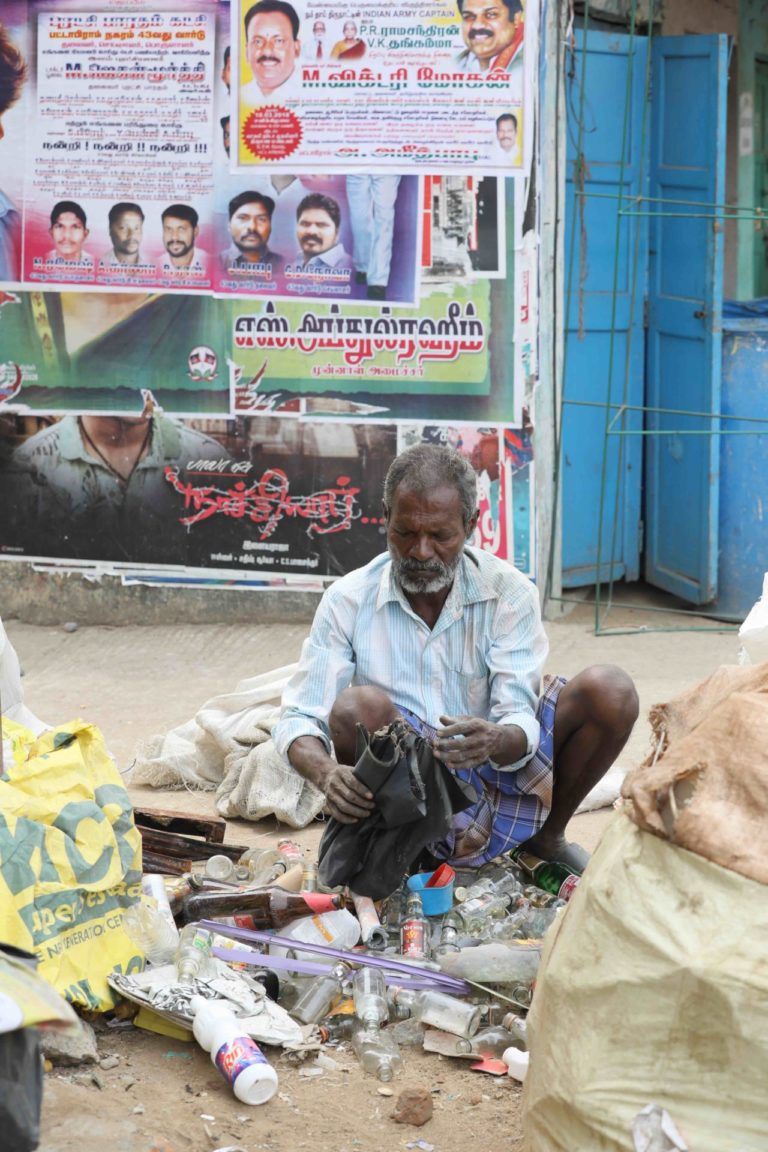
What are the benefits of a decentralized approach?
SH: It’s both less expensive and more efficient. When I started mapping the informal sector in Chennai, I was afraid it would disappear, as people tried to develop centralized approaches. These centralized approaches are incredibly expensive. It costs about 50% of an entire municipality budget to simply collect waste without recycling.
The informal sector works well because of its hyperlocal approach. Each kabadiwalla shop serves only a five-mile radius. As a result, the cost of transportation, in terms of both the time it takes to get places and the money required to do so, is drastically lower than it would be in a centralized system. In Chennai alone, we mapped 2000 kabadiwalla shops, each of which serves as an aggregation point for waste. The oldest of these has been around for 65 years. Scrap is an old business, and its infrastructure within the informal ecosystem is well-established. If governments and companies go to the informal sector for waste management, they won’t need to spend money to develop new infrastructure.
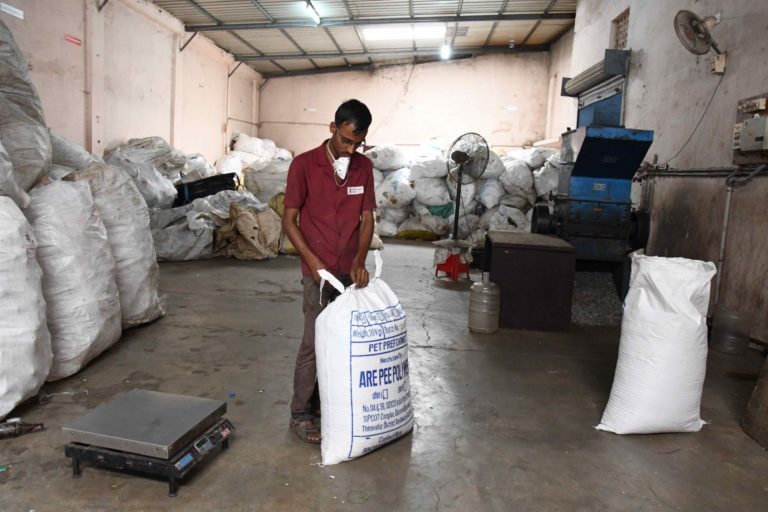
By supporting this organically built circular system, we are not only keeping together a system that provides a living for many people but one that is potentially more effective and cost-efficient.
The network efficiency of the informal sector is another reason for its success. Let’s say that I had to collect 500 tons of material. I’d do it with a tenth of the budget through the informal sector than if I hired contractors, just because of the way material moves and how the system aggregates value. By supporting this organically built circular system, we are not only keeping together a system that provides a living for many people but one that is potentially more effective and cost-efficient.
What are some examples of solutions Kabadiwalla Connect is developing?
SH: We’re running many different commercial pilots.
For example, we set up a small PET plant in Chennai and managed to recycle about 550 tons of PET in a year. Using our experiences with the PET plant, we developed a technology-based process for L2 aggregators. Veolia and Danone gave us a commercial pilot to use what we learned in Chennai to implement a version of that technology-based process in Semarang, Indonesia. Our goal is traceability — the question is how to digitize the movement of material that goes through the informal sector. Traceability is critical for brands because they need transparency in their supply chain to determine reliability and provide the government with proof that they recycled. Digitization is essential for traceability, but L2 aggregators also benefit. With digitization, L2 aggregators can track business operations, material quality, and maintain relationships with suppliers. A big recycling plant, for example, needs to have a relationship with its suppliers for any kind of risk management.
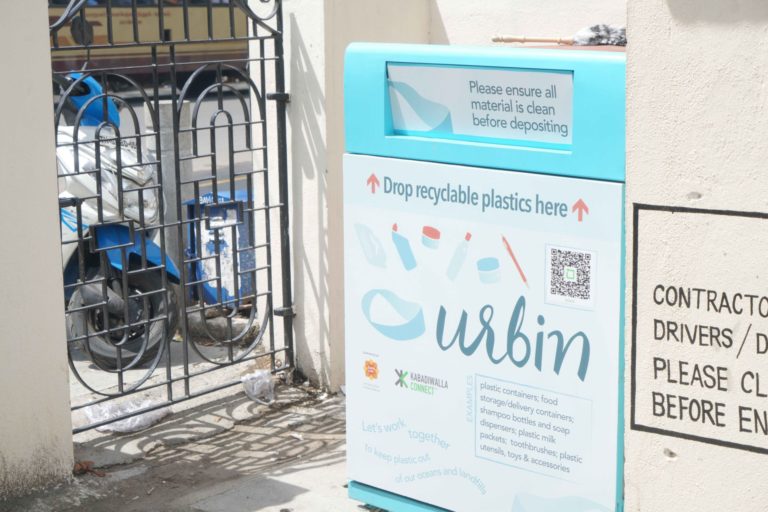
In Chennai we’ve developed smartbins to collect plastic waste, integrating small and medium waste generators with local kabadiwalla shops. Like many Indian cities, Chennai has a large percentage (68%) of small households that produce small quantities of waste. For kabadiwalla shop owners, who really need to be in their shops, going to households is not very lucrative since quantities are so small. The smartbins provide a place for people to drop off their household recyclables, and the software will let kabadiwalla owners know (through an app on their smartphones) when the bin is full. As a result, kabadiwalla shops can collect the recyclables from households in much larger volumes while saving a significant amount of time.
Editor’s Picks — Related Articles:
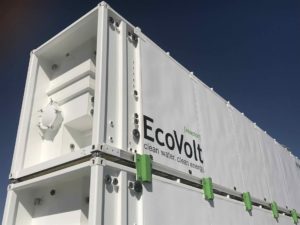
“A Decentralized Approach to a Circular Future”

“Green Earth Creations: Recycling Waste in Namibia and Supporting Country’s Economic Development”
We are also working on a certification standard designed for the informal waste ecosystem. Currently, there is no standard at all, and the informal sector isn’t very transparent. For example, at the moment a large company can’t contract with the informal sector. Part of the problem is that they have no guarantee that they aren’t supporting child labor or other unfair labor practices. We hope that certification will allow formal organizations, like corporations and government entities, who need waste management services, to work with the informal sector.
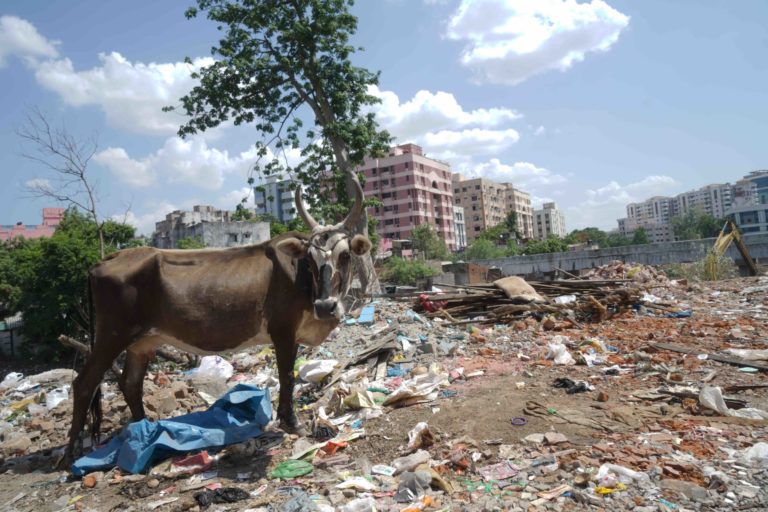
What is the ultimate goal of Kabadiwalla Connect?
SH: I want every waste picker involved with my system to have health insurance and earn a basic salary of 25,000 to 30,000 rupees. In order to accomplish this, we need to build incentives into the ecosystem so the aggregators who buy from kabadiwalla shops treat them better, and kabadiwalla shops are in turn able to pay waste pickers more.
We also hope to integrate the formal and informal sectors and increase the volume of waste that can be recycled through the informal sector. Our goal is to strengthen the informal, decentralized approach to waste management to make this possible.
What do you see as the biggest challenges going forward?
SH: Somebody needs to commit. The fear is that this conversation about recycling plastics will just fizzle out — I don’t think that will happen at this point. But governments and businesses need to invest in the idea of reforming the way we approach waste management.


